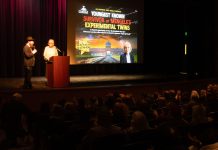City’s selection process for would-be officers and firefighters
are some of the most difficult
Gilroy – Imagine that the job you want rests on a polygraph test, your driving record and the testimony of the ex you jilted.
Sound like a nightmare? To patrol Gilroy’s streets or quash its fires, you’d better be prepared to share all that, and a lot more. Wannabe officers run a gauntlet of tests, from the routine physical to a probing psych exam.
Gilroy’s tests are among the toughest in the region, some say, and for good reason. Picking a bad apple can cost a city far more than the $800 to $1,000 ponied up for each background check. In central Florida, some police departments spend $100,000 outfitting and training a winning candidate, says Professor Richard Weinblatt of the Criminal Justice Institute, Seminole Community College. If a peace officer fouls out, that money flits away.
What’s more, a bad officer can cost a department not just its budget, but its reputation. Sacramento is still reeling from a series of firefighter scandals, from selling steroids to a sexual assault charge. In 1999, when a Newark police officer shot and killed his ex-girlfriend, critics railed against the department for failing to dig up two restraining orders, filed against him in the early 1990s. In that light, says Gilroy fire chief Dale Foster, a thorough background check is “money well-spent.”
Applicants have to hurdle two interviews before even making it to the background check, a four-to-six week process that leaves no stone unturned. LeeAnn McPhillips, Gilroy’s Human Resources manager, braces applicants for the “nerve-wracking process.” For first-timers, said Foster, “it could be considered pretty intrusive.”
Hired investigators from Preferred Investigations & Consulting Services, a Pleasanton-based company, verify applicants’ qualifications and experience, but they also dig into their personal lives in thorny interviews, and by phoning everyone from neighbors to old roommates to, yes, that evil ex. McPhillips declined to provide sample questions or subject matter, but firefighters and officers say little is out of bounds.
“You’re going to have to reveal all sorts of things'” said Weinblatt, who coaches police applicants. “I’ve been asked a lot of probing questions about sexual history – from sex with animals, to what age did I start, to who it was with. I shoplifted a comic book as a kid, and I’ve had to reveal that in every background check I’ve done.”
But the cardinal sin of background checks isn’t sex, drugs, or shoplifting: it’s dishonesty. Lie-detector tests are used to check applicants’ answers against their heart rate: a stressful prospect, even for the saintly. Firefighters and police are permitted their youthful indiscretions, but fibbing about them won’t fly.
“One hundred percent honesty is absolutely important,” McPhillips said. “If you’re dishonest, you’re automatically disqualified. I don’t mince words.”
If investigators dig up serious dirt on a candidate, they may call McPhillips to pause the process. Otherwise, the findings are compiled into a thick report – McPhillips holds her thumb and forefinger a few inches apart, to demonstrate – and returned to a panel, who sift through the information.
“We try to look at the whole person,” said Foster, who sits on panels to determine firefighter hires. “Have they matured? If you did something that didn’t show good judgment, it’s not the end for you. But are you now showing a pattern of good judgment?”
Background checks are far stiffer than in the past. Twenty years ago, when division chief Ed Bozzo was hired, he took a few exams, an oral board, and went through a Department of Justice check, which turns up arrests and convictions. Gilroy has gradually stepped up its standards, said McPhillips, as have most cities nationwide. The stakes are high.
But the stricter standards have also made it harder for cities to recruit new officers, said Weinblatt. Drug use, driving records and credit checks eliminate candidates who might have cleared the bar in the past. He cites one young man who’d held 30 jobs; another whose tell-all MySpace page showed poor judgment. As a result, he said, an agency may have to field 20 or 30 applications to fill a single spot.
“A lot of people can’t pass the background investigation,” said Weinblatt. “They’ve got issues like job stability … Personally, as a police chief, I turned down a young man who was great in every respect, except his driving record was horrible. Another agency picked him up and later fired him, because he got into several driving accidents.”
At the same time, a spotless record may not make an ideal officer, said officer Joseph Deras, Gilroy police.
“You want people that are well-rounded, so they won’t be naive,” he said. “They’ve got to have grown up – some mischief, maybe. You don’t want the squeaky-clean guy who’s 28 and living at home.”
Gilroy has it better than many cities, said Capt. Tim Main, California Department of Forestry. It’s a desirable area: as the Bay Area goes, it’s relatively affordable, and the city’s flush with funds. And though it’s growing, Foster said, Gilroy still has a hometown feel.
“In other cities, you’re treated like a number,” said Deras. “Here, everyone knows everyone. They aren’t constantly doing integrity checks – things like leaving $5 on a locker room bench, to see if you take it. We don’t have that kind of pettiness here. There hasn’t been a need.”
This week, the fire department filled its last opening, said McPhillips, and the police have attracted more qualified applicants than they can hire.
The pressure to fill openings hasn’t softened background checks, but it’s made some departments more supportive during the process, said Weinblatt. In Gilroy, McPhillips talks to those who get turned down, explains why, and tells them they can get a copy of their background check, under the Fair Credit Reporting Act. They can also reapply in a year.
But with a grueling background check to look forward to, they might not want to.
“It’s memorable,” said Bozzo. “Everyone who goes through it, says something about it.”













